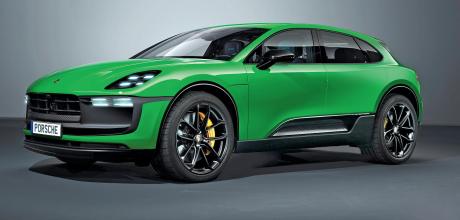Porsche targets BMW iX with 2027 electric seven-seat flagship
High-tech luxury model is ‘a very sporting interpretation of an SUV’ and will be positioned above the Cayenne from 2027.
Porsche’s iX rival All-new flagship electric crossover
A seven-seat, off-road-capable luxury electric crossover is being primed by Porsche to arrive in 2027 as a new range-topper that will take on the likes of the Mercedes-Benz EQS SUV and BMW iX.
It will be unlike any previous Porsche production model, say sources privy to early design proposals, with a length stretching beyond five metres and a profile that is “part saloon, part crossover”. CEO Oliver Blume has described the car, known under the internal codename K1, as “a very sporting interpretation of an SUV”.
When it arrives, the advanced four-wheel-drive flagship will head a growing Porsche line-up, consisting of seven individual models. The K1 will offer the latest in synchronous electric motor, high-performance battery and rapid-charging technology – developments that, insiders at the company’s Zuffenhausen headquarters in Germany say, will extend its price well beyond the £150,500 of the existing internal-combustion-engined Cayenne Turbo GT.
Already three years in conception and planning, the new Porsche model aims to build on the success of the Cayenne and Macan, Porsche’s two best-selling models over the past two decades, as well as last year (see separate story). The K1 is intended to support this trend with a combination of sportiness and utility that, it is hoped, will appeal to customers in its two largest markets: North America and China.
When it arrives, it will become the fifth electric-powered Porsche model after the Taycan, next year’s electric Macan, an electric Boxster/ Cayman pairing due in 2025 and an electric version of the Cayenne tentatively planned for launch in 2026.
Having recently been listed on the stock exchange, Porsche is positioning itself as a leader in electric car technology. “We have a clear strategy to drive electrification forward over the next few years, aiming to deliver over 80% fully electric vehicles by 2030. It’s a very strong upward curve,” said Blume of Porsche’s sales targets.
Porsche has yet to give any clues to the K1’s design, but its key attributes are said to include a unique silhouette with a short bonnet by Porsche standards, a steeply raked windscreen and a curved roof that extends into a liftback-style tailgate. To give the new Porsche suitable off-road capabilities, it is also said to feature considerable ride height in its most extreme driving mode. Ground clearance will be adjusted via sophisticated air suspension with multiple settings. The basis for the K1 is expected to be the Premium Platform Electric (PPE), given that it will share a production line with the upcoming PPE-mounted electric Macan, which is due in 2024.
The K1 was previously billed to sit on Porsche’s adaptation of parent Volkswagen Group’s Scalable Systems Platform, known as SSP Sport, but VW has confirmed a delay to the platform, originally due in the latter part of the decade.
Insiders say that when the SUV does arrive in 2027, it is likely to sit on an upgraded version of the PPE platform, which will incorporate developments showcased on the Mission R engineering concept first revealed at the 2021 Munich motor show. Among these developments is a 920V electric system for even faster charging and oil cooling for the electric motors. What battery pack the K1 could use remains under wraps, although it is expected to adopt a cell-to-chassis layout for added structural integrity with an energy capacity of over 100kWh and a WLTP range of more than 435 miles in its most efficient form.
Other chassis tech planned for the K1 includes electronically controlled four-wheel steering that will offer up to 5deg of turning angle for the rear wheels to give added manoeuvrability at low speeds around town and greater agility at higher speeds. This feature will work in combination with an electronic differential that provides a torque-vectoring effect between each individual rear wheel.
Production of the new EV model is scheduled to take place alongside that of the electric Macan at Porsche’s Leipzig factory – the same site responsible for the existing internal-combustion- engined Macan, Cayenne and Panamera.
The new range-topping EV will be unlike any previous Porsche production model, say sources.
New flagship will be capable off road and use advanced EV tech



I do not have access to information about future developments or plans of Porsche beyond what has been publicly announced. However, it's possible to speculate on what the future of Porsche might look like in 2030 based on current trends and technologies.
It's likely that Porsche will continue to focus on developing electric and hybrid vehicles, as the industry shifts away from traditional gasoline engines. The company has already released several electric models, such as the Taycan, and has plans to continue expanding its electric lineup.
In terms of design, Porsche is known for its sleek and sporty aesthetic, and it's likely that this will continue to be a defining characteristic of the brand. It's also possible that Porsche will incorporate more advanced autonomous driving features into its vehicles as this technology continues to evolve.
Additionally, Porsche has been investing in alternative fuel technologies such as synthetic fuels, which are made from renewable energy sources and can be used in existing combustion engines without major modifications. It's possible that by 2030, Porsche could be producing vehicles that run on these fuels, offering a greener option for those who still prefer the feel and sound of a traditional engine.
Overall, while it's impossible to predict the future with certainty, it's likely that Porsche will continue to innovate and push the boundaries of automotive technology and design, while also adapting to the changing demands of consumers and the industry as a whole.